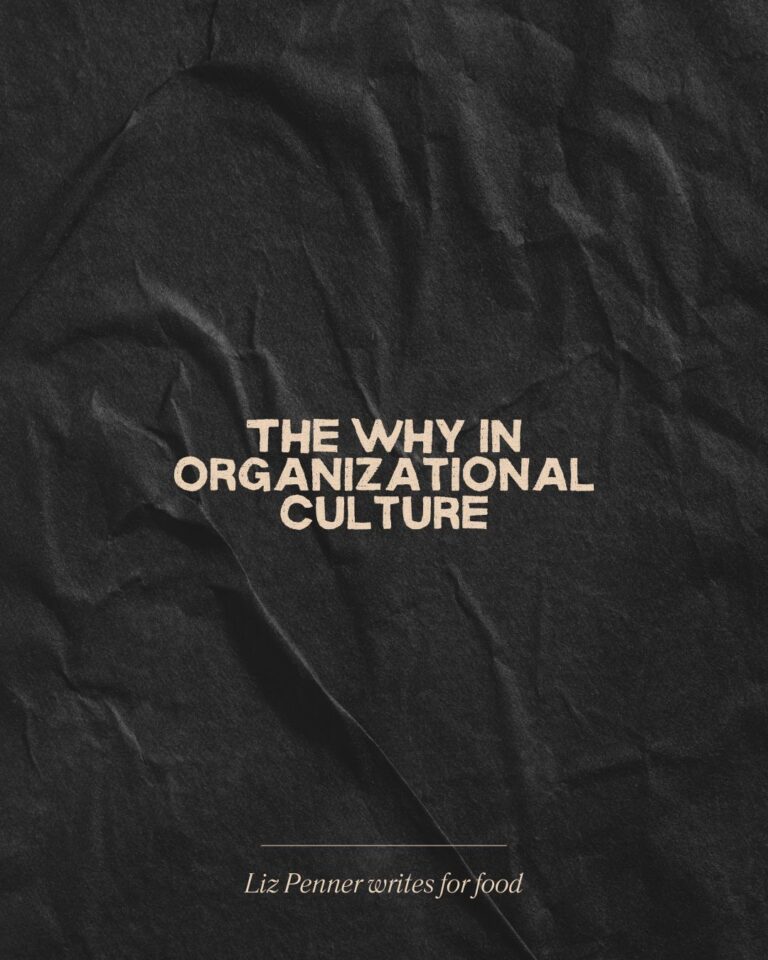
The “WHY” in Organizational Culture
I teach courses, which I love to do. In many of them, I teach that a positive organizational culture is a good thing. That’s not up for debate. We all know it’s good to be nice, better to be fair, and great to be kind. We also know we should eat our fibre and take our vitamins.
These are not revolutionary truths. But being an instructor on this topic gave me a new challenge—explaining to a room full of people why a positive culture matters beyond the surface level “because it’s the right thing to do.”
And while I teach organizational culture from multiple angles, I’ve struggled to put this concept into words. It lingered at the edges of my mind—clear in feeling but just out of reach in explanation.
And, like all great truths in life, the answer didn’t arrive when I needed it (it never does). It certainly didn’t appear when it was useful, and it most definitely didn’t come when it was convenient. Instead, on a random, rainy Wednesday in March (much like everything else that only reveals itself long after you actually need it). the answer finally came to me. Please allow me to share my theory.
What makes people care?
This blog asks a fundamental question: What does it take to build an organization where people truly care?
It’s not just about showing up.
It’s not just about collecting a paycheck.
So what does make people care—about their work, their team, and the success of something bigger than themselves?
It’s not money.
It’s not perks.
It’s not even the work itself.
It’s values.
Values shape how we connect, how we lead, and how we build something that lasts. Yet, in so many workplaces, culture is treated as an afterthought—something nice to have but not seen as essential.
But here’s the truth: A company without values is like a building without a foundation.
It might stand for a while but under pressure? It cracks.
So, what happens when an organization—or a leader—fails to stand for something?
And more importantly, what happens when they do?
This is what I want to explore.
Because whether you’re running a business, leading a team, or just trying to figure out where you belong, the values you stand for will define everything else.
And if you haven’t said them out loud yet—maybe it’s time.
You Need to Stand for Something.
There’s a saying: If you fail to stand for something, you stand for nothing.
I’ve always known it to be true. But for the longest time, I couldn’t articulate why.
So here’s my attempt at an explanation.
Forgive the construction references—I teach home builders, and if you’re one of my students reading this, I apologize in advance. You might hear this lecture again.
We ALL Share a Fundamental Need for Connection
Humans are wired for connection. We don’t just want to belong—we need to. Almost nothing great is built alone. We rely on our communities, and communities form around shared values.
To understand this you need to understand what values are and why they matter. Values form the core of who we are. They are the underpinnings of our personality. They are the fundamental why of everything we do. And while they are vital, they are also flexible to a certain point. This means that we are capable of adding new values to our sense of worth and letting others go.
Shared values allow us to connect with others. When people share values, they trust that their expectations, ethics, and priorities are aligned. Trust is what allows relationships—personal or professional—to deepen and endure.
Think of shared values as the foundation of a connection. Without them, the relationship is built on unstable ground. Imagine trying to frame a house on poor underpinning—cracks will appear, the structure won’t hold, and eventually, it all falls apart.
To build a strong community—whether in life or in business—you need people to choose each other. And you need them to choose you back.
It’s a two-way street:
✅ You need to decide that these are your people.
✅ They need to decide that you are their people.
✅ Together, you create a shared identity, a collective purpose, a cause worth standing behind.
Before we go further, let’s establish a few core truths:
- Our time is finite. Because of this, we must be intentional about where we invest it.
- Every decision we make is also a decision against something else. Saying yes to one thing means saying no to an infinite number of possible others.
- People seek the best option available to them. Whether choosing a career, a relationship, or a company, we all look for the best value exchange.
- These Truths Apply to Everything in Life
Consider this:
In dating, people look for the best match—whether that means the most attractive, the smartest, or the kindest. If we’re lucky, we find someone who makes the world a better place. Even better, sometimes someone chooses us for that same reason.
In work, people choose jobs that give them meaning. Yes, money matters. But ask people why they go to work, and you’ll hear something deeper:
👉 I want to feel needed.
👉 I want to contribute.
👉 I want to matter.
Nobody wakes up in the morning thinking, I’m going to ruin the world today.
And yet, sometimes that’s exactly what happens—when we work in places that don’t care, don’t value us, and don’t stand for anything.
Much like a poorly supported foundation, an organization without values will crack under pressure. It may stand for a while, but the moment stress is applied—whether it’s a crisis, a downturn, or just the day-to-day wear of business—things start falling apart.
And that’s where the real problems begin.
But sometimes, that’s exactly what happens—when we work in places that don’t care, don’t value us, and don’t stand for anything.
The Danger of Standing for Nothing
So what happens when a company or leader stands for nothing?
If your only goal is money—whether stated outright or simply understood—the message is clear:
💰 Maximize profit, minimize effort.
And when you hire people under that mindset, the unspoken agreement becomes:
💰 We want the most work for the least pay.
Seems logical. Maybe even harmless.
But it’s not.
Because when you stand for nothing, you give people permission to do the same.
You become nothing more than a paycheck. A transaction. A means to an end.
And when trouble comes—and trouble always comes—your team won’t show up for you.
Because why would they? You never showed up for them.
Think of it like a hastily built structure with no real reinforcements. It might look fine on the surface, but the moment a storm hits, the whole thing collapses. No support beams. No solid foundation. Just a mess of broken pieces and regret.
And that’s exactly what happens to companies that fail to stand for something.
Leading with Values
If you want loyalty, buy-in, and real commitment, you need to lead with values people can believe in, values that people can get excited about and can buy into.
Here’s what people actually rally behind:
✅ Making a difference. Nobody complains about a job that pays well and makes the world better.
✅ Being there for each other. People want to know they’ll be supported when it matters.
✅ Belonging. Yes, “inclusion” is a buzzword. But at its core, inclusion means you are welcome here. And people crave belonging more than they crave almost anything else.
You Already Stand for Something
And here’s the thing I know about you—maybe you know it too.
You already stand for something.
You just might not have said it out loud yet.
So say it.
🗣️ Put it into words.
🗣️ Say it to your team.
🗣️ Say it in your hiring process.
🗣️ Say it in your decisions.
And then step back—let your team do the rest.
Here’s the truth:
People want to stand for something.
And they will be grateful for the chance to stand alongside you.
Not everyone will buy in.
Not everyone will care.
But most will.
And when they do, they won’t just show up for the paycheck.
✅ They’ll show up when it’s inconvenient.
✅ They’ll show up in the rain.
✅ They’ll show up when you need them.
Even better?
They’ll be proud—of you, of their work, and of themselves.
You’ll build more than a workplace.
You’ll build a space where people don’t just come for a job.
💡 They come because they want to.
💡 They stay because they respect you.
Imagine this:
🎄 A Christmas party where your partner feels welcome.
🏡 A company where you’re proud to bring your kids.
✨ A place where you belong, too.
Imagine a world where the best version of yourself exists. Imagine how that would feel.
The Real Question
Maybe the question isn’t why create a positive culture.
Maybe the real question is:
Is there anything more worthwhile?
Because whether you’re building something new or reinforcing something old, the best time to stand for something is right now.
🛠️ Think of culture like the framework of a house. You don’t wait until the walls are crumbling to reinforce them. You build it strong from the start—or you shore it up before the damage spreads.
So here’s my challenge to you:
🔹 Start small.
🔹 Find one thing that matters.
🔹 Say something.
Then step back—and watch what happens.


